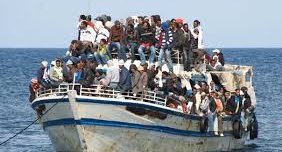 ‘Tahrib’ ‘Tahrib’ ‘Tahrib’, which means trafficking, is a word that Somali youths know all too well in Somalia. Why? because it is one of the most popular strategies for escaping unemployment, poor quality of education, conflictive environments, insecurity, clannism, poverty, loneliness and the disappointment of failed dreams.
‘Tahrib’ ‘Tahrib’ ‘Tahrib’, which means trafficking, is a word that Somali youths know all too well in Somalia. Why? because it is one of the most popular strategies for escaping unemployment, poor quality of education, conflictive environments, insecurity, clannism, poverty, loneliness and the disappointment of failed dreams.
All young people want a good life, a house, an education, a great car, and a family. Youth are willing to do whatever possible to realize these dreams. Since Western countries are known for better opportunities, freedom and better quality of life, Somali youth are willing to take big risks to get it all.
When one starts to talk about tahrib, it seems like a terrible tragedy where hundreds of lives are often lost to the sea, where mothers are diagnosed with sleep deprivation, and families are seen stranded at the marketplace selling their assets and begging for help to pay ransom to “Magafe,” illegal smugglers/debt collectors who are holding their children captive. We see families separating due to emotional distress caused by blaming one another within the family.
Somalia is losing many skilled people, both uneducated and educated people, to this perilous journey. The economy automatically depreciates after losing prosperous youth workers. Family lineages disappear and get disrupted and the country’s population is shrinking due to the loss of lives. According to United Nations, At least 3,800 people lost their lives in the Mediterranean Sea in 2016, many of whom were Somali youth.
Watching television and following social media, it feels terrible to see images of dead bodies and missing body parts floating on distant shores. At first, interviews and information of youth abused, beaten and raped to death in the Sahara Desert shock us but soon they become history like any other event and end up forgotten the next morning. The new day brings with it new details and information of a brother, a sister, a family relative, a neighbor’s son or daughter or a friend held up in Libya or on a sinking boat in the middle of the Mediterranean sea, or in Europe taking a picture of the fine lifestyle.
This barrage of news creates a chaotic mindset for many Somali youth and a good number end up persuaded to join the rest in the painful journey in search of a better life in the West. Peer influence by friends who survived the migration and had better opportunities triggers the greatest response and convinces others to join the harrowing journey. Many young people are desperate to acquire a foreign passport, believing that it will open doors of opportunity.Some young people believe that only those who study abroad will have access to higher paid jobs either in the political arena or with major companies. Rate of unemployment for youths, low salary/wage payment, gender inequality and social media motivation is also among motivator for youths to go for ‘tahrib’.
There is a long list of things that urgently need to change if we want to solve the problem of tahrib. We need more jobs. We need serious progressive awareness initiated for youth. Vocational schools for youth should be created immediately. We need real gender equality. Youth with business ideas must have access to support from financial institutions and with less assurance conditions. And we need stronger law enforcement so that perpetrators/captures are held accountable.
A teacher, a politician, a driver, business man, you and me, we all have a role to play. So, what are you doing to change the situation, what are you doing to stop the loss of innocent lives every day?

